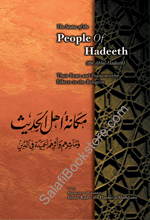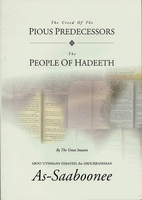It's Like genealogy


Currently, I am reading the books pictured above. Usually, I try not to read two books at one time and actually, I don't get to read anything at all, but with 20 min. open before bed and a query lingering over my head, I started reading. The two books are The Creed of the Pious Predecessors The People of Hadeeth by The Great Imam Aboo'Uthmaan Ismaa'eel ibn Abdurrahman As Saaboonee and the other The Status of the People of Hadeeth by Allaamah and Muhaddith Shaikh Rabee' ibn Haadee al-Madhkhalee. Essentially these books discuss identical issues. The book by As Saboonee focuses on the people of Hadeeth's treatise of issues of the Aqeedah of Allah and his Messenger and Shaikh Rabee's book looks at the status of the great Muhadaatha of the past. The reason why I zeroed on on these texts, because I have been noticing since the explosion of Islamic information on the web many individuals, communities and institutions abandoning the methodologies of the sunnah and replacing them with man- made ideologies. So much so that the believers don't know who the real scholars are and rely on callers and imams for guidance in understanding the deen of al-Islam. I have been in a position many times when I hear individuals say that they don't know who to follow, who are the shayuk and are confused as to who is on the correct path.
Shaykh Al-Baanee, Hafidhahullah, said"
"Some people may find it hard to accept the explanation of the those scholars that the Victorious Group and the Saved Sect, are the People of the Hadeeth, but that is not strange if we remember what follow:
That the People of of Hadeeth are, due their specialization in studying the Sunnah and what is connected to it, likewise the knowledge of the biographies of the narrators and the defects in the narrations and also the knowledge of the different routes of narration, most definitely, they are the most knowledgeable of the people about the Prophet, (Sallahu Alahi wa salaaam) and his guidance, manners, battles, and everything else connected to him."
And Al -Khateeb al-Baghdaadee (Hafidhhahullah) said:
"And if only, the person of blameworthy opinions were to occupy himself with beneficial knowledge and if he were to seek the Sunnah of the Messenger of Allah (Sallahu Alaihi wa Salaam), and that he followed the way of the scholars and the People of the Hadeeth, he would find that which would enrich him, as to whatever he sought. . . So the People of Hadeeth are Allah's faithful custodians among men and the link between the Prophet and his nation."
For many muslims we focus our attention of the obvious scholars such as Sahih Bukhari and Muslim, as well as the writings of The four great imams, ibnul Kathir. But since the beginning of the khalifat, for every generation since then have been blessed with dozens of scholars, Great Imams of the times. The ones mentioned above achieved greatness at different times and were not contemporaneous with one another. However, this scholarship has not ceased. You see All true scholarship isn't already compiled, translated and published ready to ship from Islam.com. There have been Great Imams in our time, like of Shaykh al-Baanee, Ibn Baaz and Uthaymeen, Hafidhahullahuma. Believe it or not, there still continue to be Great Imams in the making. But how to do find these scholars; People Hadeeth? Al-Baanee and Uthaymeen in their writings declared the knowledge of living scholars to be strong, without mistakes in their methodologies and only the ignorant would critize them. An example would be Shaykh Rabee' hafidhahullah. He is professor in the University of al-Madinah and head of the department of Sunnah, in the Higher Studies department. When asked about him, Shaykh Uthaymeen replied,"I do not know it [methodology] to be contrary [to Ahlus-Sunnah]. Shaikh Rabee' has been praised by the people of knowledge of today. I do not know anything but good about him." I found this quote in his book The Status of the People of hadeeth along with favorable quotes from Al Baanee, ibn Baaz and Fawzaan. So if these individual praise him, why wouldn't we take our deen from him? Others, Masha'Allah who hold great Ilm are Shaykh Ali Shaykh, the Grand Mufti of Saudi Arabia and Shaykh Fawzaan of the Ulema Kibaar.But how do we access him and others like him?
I guess finding the real scholars can be difficult since the dua'at and imams are so accessible. It seems every other blog has a link to Zaytuna and Al Maghrib institutes. A number those leading gatherings in the popular institutions have studied in various places with the Shayuk. Some of their teachers are custodians of the Sunnah and some are not. These institutions advertise colorful classes on history, love and marriage and brotherhood, but these lessons can be learned by exploring the books that lay the foundations of our beliefs : Forty Hadeeth, Riyadul Saliheen, Beneficial Knowledge, Qowlul Mufeed, Bulughul Muram, Thalathul Usool and there are so many more.
These classes are available online, in-person or via the phone by the scholars themselves with translations by their students. Why not cut out the middle man and go straight to the source.
My policy these days is if individual isn't known by the people of hadeeth then it's best to leave him alone.
Check out these sites:
www.spubs.com
www.bakkah.net
www.sahab.net (arabic)
www.palktalk.com - like religion/islam/salafi duroos 0r Salafipublications, Masjid Rahmah . . .


1 Comments:
Something that i'm trying to get my head around is the difference in understanding of the term Ahlus Sunnah...the conflict stems around Salafi movements using the term to describe their aquida and then traditionalist sunnis who follow Ashari or Maturudiyyah aquida using the term...and as the term was originally used to describe all four of the madhabs although i think Hanbali school aquida differs (not sure) i am confused.....why the differing of opinions...can't we say Salafi and traditionalist Sunnis are all Ahlus Sunna with just some differences in points of aquida??? one of the most noticeable points seems to fit around concept of bida'ah....i am sitting on the fence, more attracted to spirituality of traditionalist Sunni scholarship but wary in some areas like these issues of what constitutes bida'ah and also idea that you should follow a specific madhab..and then i'm wary of the ultra-literalist approach of Salafi scholars and its total dismissal of Sufism....so i don't know which approach to take..
6:47 PM
Post a Comment
<< Home